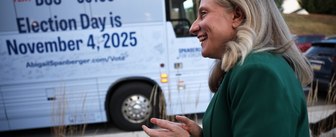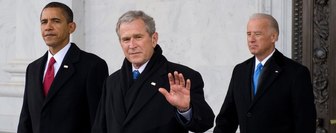Recent policymaking history aside, common discussions of the parties suggest that there are differences in the perceived willingness of Democrats and Republicans to deal with the deficit. In light of these perceived differences, we sought to understand whether members of the public really do distinguish between the likely consequences of future Democratic or Republican control of the institutions of policymaking. To do so, we asked a sample of 1000 YouGov respondents to answer this question:
where the text in brackets was randomized across respondents such that 1/3 of respondents received the “Republican control” scenario, 1/3 received the “Democratic control” scenario, and the remaining 1/3 received the “divided government” scenario.
Average responses to these different scenarios are presented in Table 1, with the “Decrease a little” and “Decrease a lot” response options collapsed into “Decrease” and a parallel handling of the two “Increase” response options. In the population as a whole, we immediately see partisan differences. In particular, in the Republican control scenario, about 36% of the sample believes the deficit will decrease, compared to only 18% in the Democratic control scenario (a +18%, Republican-Democrat difference). Similarly, 49% believe the deficit will increase if Democrats obtain unified political control, versus only 36% if the Republicans do so (a -13%, Republican-Democrat difference). Of note, the deficit staying the same is the dominant response (48%) only for those presented with the divided government scenario—plus ça change.
| Table 1. Beliefs about whether the Deficit Will Increase or Decrease after the 2012 Election | ||||
|---|---|---|---|---|
| Divided Government Scenario | Republican Control Scenario | Democratic Control Scenario | Difference between Republican and Democratic Control Scenarios |
Decrease | 14% | 36% | 18% | 18% |
Stay about the same | 48% | 28% | 33% | -5% |
Increase | 38% | 36% | 49% | -12% |
Note: YouGov Sample, April 2012. | ||||
Of course, a persistent theme this electoral cycle has been sharp partisan differences in survey responses on questions ranging from beliefs about the current economy[1] to responsibility for gas prices.[2] Prior published work has also shown that such partisan differences change rapidly with election outcomes. For example, following the unexpected Democratic takeover of both the House and Senate in 2006, the same Democrats (Republicans) became more (less) optimistic about the economy than they were a month earlier.[3] Breaking down responses to our question by party reveals a similarly striking pattern in the current electoral cycle.
| Table 2. Beliefs about whether the Deficit Will Increase or Decrease after the 2012 Election, by Respondent Partisan Identification | ||
|---|---|---|
| Difference between Republican and Democratic Control Scenarios | |
| Democrats | Republicans |
Decrease | -13% | 62% |
Stay about the same | -17% | 10% |
Increase | 31% | -72% |
Note: YouGov Sample, April 2012. | ||
In Table 2, we show separately for self-identified Democrats (column 1) and Republicans (column 2) the difference in responses for the unified Republican control condition minus the unified Democratic control condition. Democrats believe their party is more likely to reduce the deficit (by 13 percentage points) and less likely to increase it (by 31 points). Those difference are much smaller, however, than the gaps Republicans display. Republicans are 62 percentage points more likely to believe the deficit will decrease under Republican than Democratic control, and 72 points more likely to believe it will be larger under Democratic control.
So, either Republicans really believe they will be far more able to muster the coalition necessary to decrease spending, or they are far more unified in their survey responses in favor of their party. In years past, we might have attributed it all to partisan cheerleading in survey response, but other research suggests it isn’t just fantasy—partisans appear to act on these beliefs outside of the political arena too.[4] Of course, it remains unclear whether this is simply because Republicans care a great deal more about this issue and therefore feel inclined to “stay on message” with their party or really hold these beliefs. Maybe the easiest way to find out will be to put some money on the line…[5]
*(For the curious, Independents give Republicans the edge by 19 points for reducing the deficit and Democrats by 11 points for increasing it).
[1] http://today.yougov.com/news/2012/03/12/our-own-facts/
[2] http://pollsandvotes.com/PaV/2012/04/gas-prices-and-partisan-filters/
[3] http://onlinelibrary.wiley.com/doi/10.1111/j.1540-5907.2009.00424.x/abstract;jsessionid=9B7E002C2500C9E62C51C701BE7FB96A.d01t04
[4] http://journals.cambridge.org/download.php?file=%2FPSR%2FPSR103_03%2FS0003055409990098a.pdf&code=55c0cff84bb6499c50aadfcbedad50cd
[5] http://www-personal.umich.edu/~lupia/Papers/Prior_Lupia_AJPS_2008.pdf








